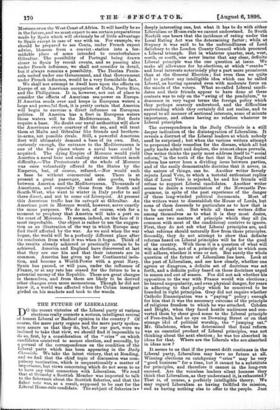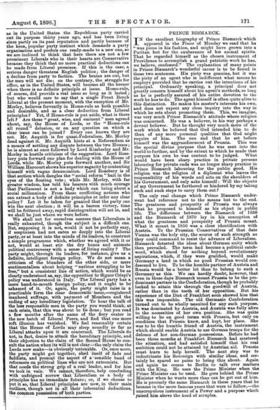THE FUTURE OF LIBERALISM.
TAO the recent victories of the Liberal party at various elections really connote a serious, intelligent revival of honest Liberal or Radical opinion in the country ? Of course, the mere party organs and the mere party spokes- men assure us that they do, but, for our part, were we inclined to take that view, we should find it impossible to do so, first, by a consideration of the " cries " on which candidates contrived to secure election, and secondly, by a perusal of the correspondence on the condition of the Liberal party which has been appearing in the Daily Chronicle. We take the latest victory, that at Reading, and we find that the chief topic of discussion was com- pulsory vaccination, which is unquestionably a matter of importance, but views concerning which do not seem to us to have any vital connection with Liberalism. We read that at Grimsby a Scottish Member was imported to talk to the fishermen about the Scottish fisheries, and that the fisher vote was, as a result, supposed to be cast for the Liberal Home-rule candidate. The subject of fisheries isa deeply interesting one, but what it has to do with either Liberalism or Home-rule we cannot understand. In South Norfolk one hears that the incidence of rating under the Local Rating Act was the determining factor ; while at Stepney it was said to be the unfriendliness of Lord Salisbury to the London County Council which procured a Liberal triumph. But in whatever quarter, east, west, north, or south, one never learns that any clear, definite Liberal principle was the one question at issue. We make all allowance for by-elections, at which " cranks " and local interests notoriously play a part more prominent than at the General Election ; but even then we quite fail to gather any intelligible idea which can be called Liberal, as having operated even with moderate force on the minds of the voters. What so-called Liberal candi- dates and their friends appear to have done at these contests was to rely on the "swing of the pendulum," to denounce in very vague terms the foreign policy which they perhaps scarcely understood, and the difficulties surrounding which they certainly did not realise, and to appeal to all manner of sectional interests, some of minute importance, and others having no relation whatever to Liberal principles.
The correspondence in the Daily Chronicle is a still deeper indication of the disintegration of Liberalism. It reveals a distrust of the Liberal leaders at which nobody need be surprised ; but when the various writers attempt to propound their remedies for the disease, which all but party hacks admit and deplore, the utmost chaos prevails. One writer thinks the party must address itself to "social reform," in the teeth of the fact that in England social reform has never been a dividing issue between parties, and of the easily demonstrable doctrine that it never, in the nature of things, can be. Another writer fiercely rejects Local Veto, to which a teetotal enthusiast replies that if Local Veto is rejected, he and his friends will refuse to support Liberal candidates. Another writer seems to desire a resuscitation of the Newcastle Pro- gramme, in spite of the past experience of the danger of these long-winded political documents. Most of the writers want to disestablish the House of Lords' but none of them descends to particulars as to how that is to be carried out. But while all these writers differ among themselves as to what it is they most desire, there are two matters of principle which they all (in common with most of the candidates) contrive to ignore. First, they do not ask what Liberal principles are, and. what reforms should naturally flow from those principles. Secondly, they do not attempt to show that definite reforms based on Liberal principles will be for the good of the country. With them it is a question of what will win an election, not of a principle of right to which men will adhere, whether it wins or not. But surely the whole question of the future of Liberalism lies here. Look at the past of Liberalism, and see how clearly, whether one agrees or disagrees, a definite set of doctrines was set forth, and a definite policy based on these doctrines urged in season and out of season. Fox did not ask whether his opposition to the war with France would win elections ; he braved unpopularity, and even physical danger, for years in adhering to that policy which he conceived to be founded in right principles. Grey did not inquire whether Catholic Emancipation was a " paying " policy ; enough for him that it was the necessary outcome of the principle of religious freedom to which he was attached. Cobden and Bright, when they faced hostile audiences and con- verted them by sheer good sense to the Liberal principle of Free-trade, had no eye on Downing Street or on that strange idol of political worship, the "jumping eat." Mr. Gladstone, when he determined that fiscal reform was an essential product of Liberal principles was not thinking about the next election ; he was too absorbed in ideas for that. Where are the Liberals who are absorbed in ideas now ?
It seems to us that if the present drift continues in the Liberal party, Liberalism may have no future at all. Winning elections on catchpenny " cries " may be very "good business" for a time, but it cannot be a substitute for principles, and therefore it cannot in the long-run succeed. Are the voiceless leaders silent because they think that Liberalism, as they understand it, is exhausted ? That is, of course, a perfectly intelligible theory. We may regard Liberalism as having fulfilled its mission, and as having nothing else to offer to the people. Just as in the United States the Republican party carried out its purpose thirty years ago, and has been living since partly on its past reputation and partly because of the keen, popular party instinct which demands a party organisation and prefers one ready-made to a new one, so we are inclined to think that here there are not a few prominent Liberals who in their hearts are Conservative because they think that no more practical deductions can be made from Liberal premises. If this is the case, a serious danger threatens English politics ; the danger of a decline from party to faction. The brains are out, but the men will not die; on the contrary, the struggle for office, as in the United States, will become all the keener when there is no definite principle at issue. Home-rule, of course, did provide a real issue so long as it lasted ; but who would care to say that a, single Front Bench Liberal at the present moment, with the exception of Mr. Morley, believes fervently in Home-rule as both possible and desirable, and as a clear deduction from Liberal principles ? Yet, if Home-rule is put aside, what is there left ? Are these "great, wise, and eminent" men agreed about, say, the House of Lords, or the "Home-rule all round" delusion, or on any question on which a clear issue can be joined ? Every one knows they are not. Mr. Asquith is for quasi-Federalism, Mr. Morley dead against it. Mr. Asquith hints at a Referendum as a means of settling any dispute between the two Houses ; he is almost at once followed by Lord Kimberley and Mr. Morley in hostile criticism of the suggestion. Lord Rose- bery puts forward one plan for dealing with the House of Lords, while Mr. Morley puts forward another, and Sir William Harcourt shows his superior sagacity by contenting himself with vague denunciation. Lord Rosebery is of that section which dangles the "social reform" bait in the eyes of the floating vote ; while Mr. Morley, with far greater wisdom, has told his hearers with much courage that Parliament is not a body which can bring about a social millennium. From these conflicting notions who can extract a body of definite principles or infer any clear policy? Let it be taken for granted that the party can win the next election ; it will be a barren victory, time will be frittered away, rapid disintegration will set in, and we shall be just where we were before.
We shall not for ourselves assume that Liberalism is really exhausted, though the subject is a difficult one. But, supposing it is not, would it not be perfectly easy, if scepticism had not eaten so deeply into the Liberal party, or at least into the minds of its leaders, to construct a simple programme which, whether we agreed with it or not, would at least stir the dry bones and animate political controversy with a sense of living reality ? The party might, through its leaders, for instance, give us a definite, intelligent foreign policy. We do not mean a criticism of the blunders of the other side, or mere sentimentalism about helping "nations struggling to be free," but a consistent line of action, which would be as clearly understood as, say, the opposition to Signor Crispi's policy was understood in Italy. The Liberal party has a mere hand-to-mouth foreign policy, and it ought to be ashamed of it. Or, again, the party might raise in a practicable form the clear democratic issue,—registered manhood suffrage, with payment of Members and the ending of any hereditary legislation. To hear the talk of the less responsible men in the party you would think, at each crisis, that this was about to be done ; but you read a few months after the name of the fiery orator in the new batch of Liberal Peers, and find that one more soft illusion has vanished. We feel reasonably certain that the House of Lords may sleep soundly so far as Liberal attacks upon it are concerned. The Liberals do not, in fact, desire to attack the hereditary principle, and their objection to the claim of the Second House to con- sult the nation when its will is not clear—the only claim the Lords now make—is obviously Untenable. Or, once more, the party might get together, 13hed itself of fads and faddists, and present the aspect of a sensible band of reformers on political lines who are not extremists. But that needs the strong grip of a real leader, and for him we look in vain. We cannot, therefore, help concluding with unfeigned sorrow that Liberalism as a body of principles has no immediate future; or, if we choose to put it so, that Liberal principles are now, in their main outlines, though not in all their inferential deductions, the common possession of both parties.



































 Previous page
Previous page